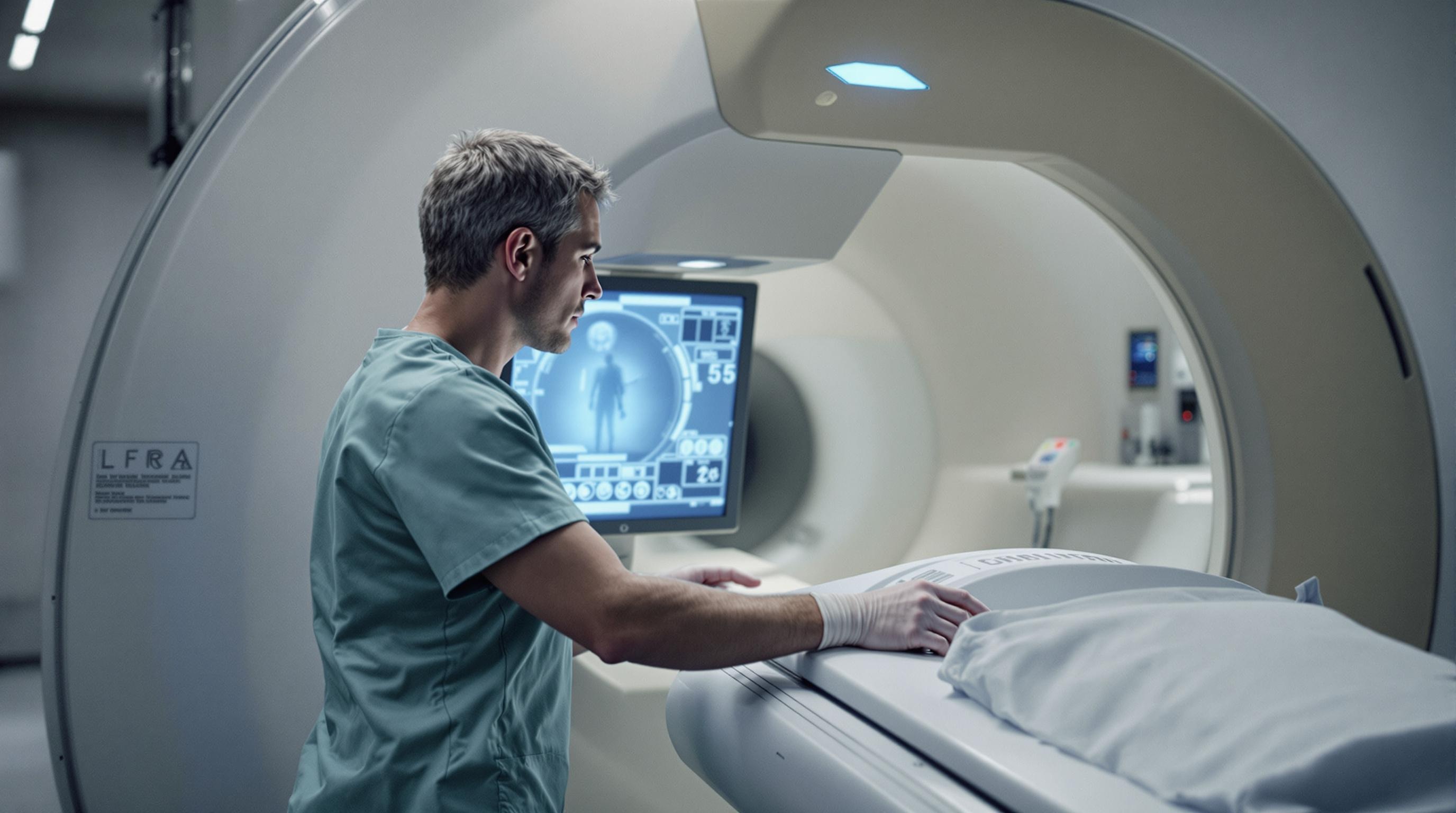Radiation therapists deliver high doses of ionizing radiation to cancer patients. To become a radiation therapist, complete an accredited radiation therapy program, earn an associate or bachelor’s degree, pass the ARRT certification examination, and apply for a state license. Clinical training is required.

What a Radiation Therapist Does
Radiation therapists treat cancer patients by operating machines that deliver precise radiation treatment. They follow detailed treatment planning guidelines set by the radiation oncology team. They position patients, explain procedures, and check for unusual reactions.
Radiation therapists work in:
- Hospitals
- Outpatient clinics
- Cancer treatment centers
They offer emotional support, maintain detailed records, and work with radiation oncologists and other healthcare providers.
Education Requirements
You must complete a radiation therapy program and earn a degree to become a radiation therapist. Most students choose between an associate degree (2 years) or a bachelor’s degree (4 years).
Common subjects include:
- Human anatomy
- Radiation physics
- Radiologic technology
- Medical terminology
- Radiation protection
These programs prepare students to treat patients, work with technology, and pass certification tests.
Choose an Accredited Radiation Therapy Program
Only programs accredited by the Joint Review Committee on Education in Radiologic Technology (JRCERT) meet licensing standards. Accredited programs teach patient care and safety using real equipment and clinical settings.
Top radiation therapy programs in the U.S. include:
- MD Anderson (TX)
- Oregon Institute of Technology (OR)
- Washburn University (KS)
Students must complete both classroom instruction and clinical rotations to demonstrate competency.
Clinical Training and Hands-On Experience
Radiation therapy students complete 1,200–1,500 clinical hours before graduation. This happens in hospitals or cancer centers.
Students learn:
- How to operate radiation machines
- How to deliver high doses safely
- How to follow treatment planning
- How to communicate with cancer patients
- How to spot unusual reactions
[Image: Radiation therapy student assisting in patient setup during clinical training]
Certification and State Licensing
All graduates must pass the ARRT certification exam and apply for a state license. Most states require an unrestricted state licensing examination to work.
Steps:
- Graduate from an accredited program
- Pass the ARRT credentialing examination
- Get licensed by your state
- Maintain a valid Basic Life Support (BLS) card
Once licensed, you’re a registered radiation therapist and can begin treating patients.
Education and Licensing Summary Table
This table summarizes degree types, licensing, and required training for becoming a radiation therapist.
| Requirement | Details |
|---|---|
| Minimum Education | Associate or Bachelor’s Degree |
| Program Accreditation | Joint Review Committee (JRCERT) |
| Certification | ARRT Credentialing Examination |
| License Type | Unrestricted State Licensing Examination |
| Clinical Hours Required | 1,200–1,500 hours |
| Key Coursework | Radiation Physics, Human Anatomy, Medical Terminology |
| Continuing Education | Required for license renewal |
Source: JRCERT, ARRT, program data
Career Growth and Job Outlook
The U.S. expects 6% job growth for radiation therapists through 2032. Hospitals and oncology clinics continue to hire trained professionals to support cancer treatment.
Most radiation therapists work full-time. Schedules often follow standard work hours. Many jobs include benefits like health insurance and retirement plans.
Career advancement paths include:
- Lead radiation therapist
- Clinical supervisor
- Program chair
- Educator for radiation therapy students
Salary and Employment Data
Radiation therapists earn a median salary of $89,530 per year. Entry-level roles start near $70,000. Experienced therapists earn $100,000+ depending on the setting.
Top-paying areas:
- California
- New York
- Washington
- Massachusetts
Hospitals and large radiation oncology centers pay higher wages than outpatient clinics.
Required Skills and Attributes
Radiation therapists need both technical knowledge and people skills.
Essential skills:
- Communication skills to comfort patients
- Understanding of radiologic sciences
- Ability to follow safety procedures with ionizing radiation
- Strong focus on radiation protection
- Ability to work with clinical teams
Most radiation therapists play key roles in daily treatment planning and decision-making.
Work Environments
Radiation therapists work in clinical settings focused on cancer treatment. Most work with the radiation oncology team, including:
- Radiation oncologists
- Dosimetrists
- Medical physicists
Each session takes 15–30 minutes. Therapists treat the same patients for several weeks.
Work locations:
- Hospital cancer wings
- Outpatient oncology centers
- Specialty clinics
- University health systems
Advancement Opportunities
Most radiation therapists grow into leadership, education, or specialized roles.
Common advancement paths:
- Senior radiation therapist
- Lead clinical instructor
- Radiation therapy program chair
- Primary liaison for student training
- Technical training supervisor
Real Example:
Karen started with an associate degree. After five years, she became the primary liaison for radiation therapy students and helped new graduates actively seeking employment.
Questions We Get Asked the Most About Becoming a Radiation Therapist
These are the questions we get asked the most often in regards to how to become a radiation therapist.
How long does it take to become a radiation therapist?
It usually takes 2 to 4 years. Associate degree programs take 2 years. Bachelor’s programs take 4. After school, students must pass the ARRT exam and apply for a license.
Do radiation therapists treat patients?
Yes. Radiation therapists treat cancer patients using radiation therapy machines. They position the patient, deliver treatment, and check for side effects.
Is radiation therapy a good career?
Yes. It’s a fulfilling career with strong pay, emotional rewards, and high job satisfaction. Most radiation therapists say they enjoy helping patients.
What degree do I need to become a radiation therapist?
You need either an associate’s degree or bachelor’s degree in radiation therapy or radiologic sciences. Accredited programs are required for certification.
Where do radiation therapists work?
Radiation therapists work in clinical settings, including hospitals, cancer centers, and specialty clinics. They work closely with radiation oncologists and other health care providers.
Final Thoughts
Becoming a radiation therapist means starting a rewarding career in health care. You treat patients using precise equipment and become part of a team that improves lives through cancer treatment. With training, certification, and compassion, you can make a real difference.







